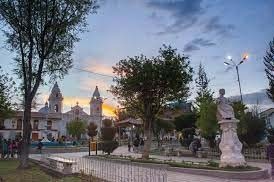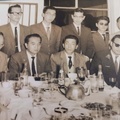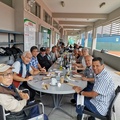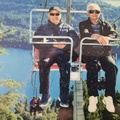Whenever the sky surprises me with its blue tone, it fills me with nostalgia. Color envy produces in me the emotional state of its color. I corrected my mind to be in my childhood years and feel relieved. The Continental Cinema, behind me and I, in the middle of the square, using “Lingo”, the game of jumping and support because we did everything in the best way and with the intention of having a good time.
Maybe “The Blue Sky” didn't look so complete, but the tone of a summer made our game, the envy of a childhood that, without having everything, let us live happily.
How many times do I try to remember when, at three years old, in an old box, I was the one with the sublime task of walking my sister Juana. And then, like a dizzy spell, I went up the steps and leaned over a cot, picked up the coca leaves and put them in my mouth. Without a doubt, in the middle of the farm the blue of the sky was a sign that in a short time my father would have the reason for his departure.
Before I was eight years old, I already had in my mind “ The Blue of the Sky” about a languid beach that covered the beautiful Carquín farm, in the serene city of Huacho. The Matsumura family existed in every corner of the farm. It was between 1947 and 1948, when the humanity of my eight years grew, with the immense warmth of a childhood with the lullaby of the obachan, who only paid attention to everyone who arrived and filtered into their serene and peaceful family condition. The mystery of a life in the country surrounded by a beach. It was the best feeling for our group of naughty children who had arrived from the capital.
“The blue of the sky” was always the Creed of my life for me. And the most extensive and grandiose picture that the city of Jauja gave me for twelve years of my youth. Reaching the age of eight and living until I was twenty was a ceremony that filled my eyes at every moment of my life, with the wide sky of unparalleled stillness and the dark and serene place of the nights that, filled with stars, some, They simply let themselves be carried away by eternity in flight. And we spit on the ground because that's what it was about. Make a wish and have the shooting star grant it to us.
They said that Jauja was for the sick and there we were uniting our lives in pursuit of salvation. Blessed is the air, the climate, nature and the time in which we lived as one family. And “The blue sky” with its noble scroll baptized us every morning that life became one more step of pleasant experience and union. The color of its fields and its hidden paths, the nostalgia of its singing birds and the arrival of a dense rain flirting with the wind. “The blue sky” then extended and the passage of a radiant sun gave us the warning that the climate of Jauja was for tuberculosis patients the healthy remedy for their sad discomfort.
I blessed my life with the equality of the skies on the beaches and embracing the marine fruit of its waters. With the friendship of the fishermen I had the trip of dreams through every corner that the sea gave us to battle with the fish. On the sinister hook with its virtual bait, which waged an unequal battle with the fish. From there came every afternoon the romantic bolero with which Los Panchos sweetened us every night when love used to appear from the heart. The bolero “The sea and the sky” says:
“The sea and the sky look equally blue and in the distance they seem to come together, you better remember that the sky is always the sky and that the sea will never, ever reach it.”
Divine lesson in not confusing things, especially on the beach, when in the distance the sun sets and pretends to unite the sky with the sea.
The La Unión Stadium, better known as AELU, gives us “The blue of the sky” of surprising beauty every day that the sky is clear. From my ninth-floor balcony, the mornings are filled with a daily rush of cars as students from Colegio La Unión enter. The memory of my student days makes me go back to my days in Jauja. The same trouble and the contagion of colleagues. The large patio and the meeting with our khaki uniforms and our cristinas on our heads. The blue button indicated the primary school students and the red one indicated the secondary school students.
Go back to those years when inkwells had the magic of blue and red, and few had the black of Indian ink. Having them in hand was the suicide of staining our uniforms and even more so when recess time was the temptation to leave a task unfinished. Crying at night after daily punishment.
“The blue of the sky” is the maximum expression of AELU on a morning of radiant sunshine. Without clouds in the sky or crazy winds. And every afternoon, with the union of friends, life tends to facilitate the total dedication of a faithful friendship. Laziness leaves our thoughts and shaking time is remembering that the years never tire us. There we think that the body needs sport and that life is a sensation that we must know how to take advantage of. The AELU is filled with memories for every adult who comes our way. And in the same pride that the sports field makes us feel. It also reminds us of the clubs, leaders, athletes, players and workers who assisted us in all these years that were the total confinement of a pandemic that still tends to return.
Patience is the tone of voice that reminds us of our parents, who came from a distant country without knowing the language and gave us the best they had to give us the peace of mind that we enjoy today. They, who only had daily work in their stores and their jobs, remind us that solidarity, honesty, work and respect are the foundation of life. That blue sky that will always be aware of our dreams.
© 2022 Luis Iguchi Iguchi






